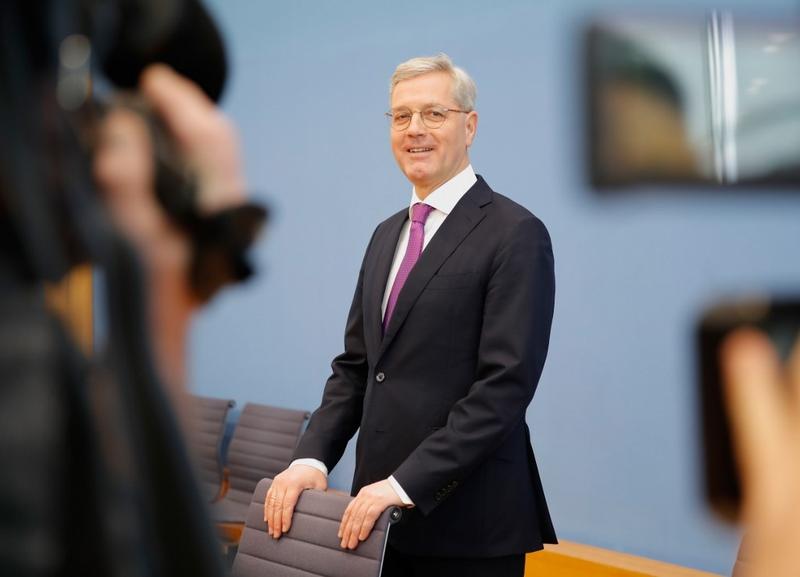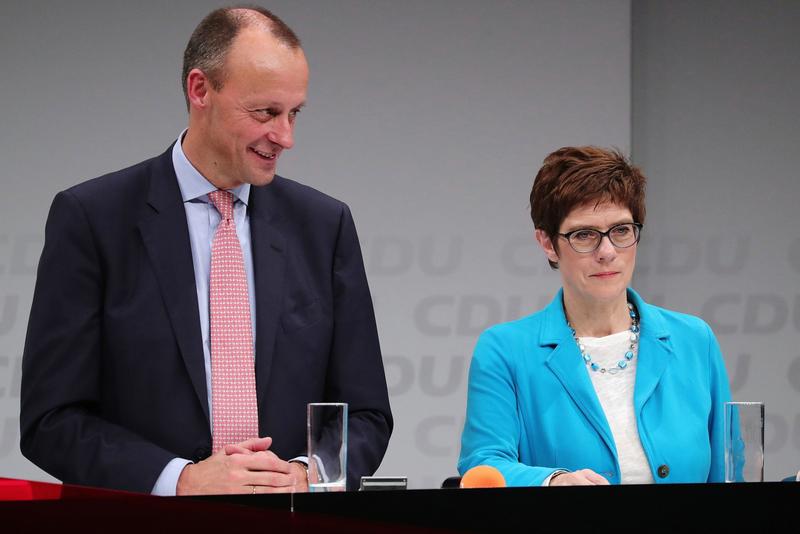 German politician of the Christian Democratic Union (CDU) Norbert Roettgen poses ahead of a press conference on his candidacy for the CDU presidency on Feb 18, 2020 in Berlin. (ODD ANDERSEN / AFP)
German politician of the Christian Democratic Union (CDU) Norbert Roettgen poses ahead of a press conference on his candidacy for the CDU presidency on Feb 18, 2020 in Berlin. (ODD ANDERSEN / AFP)
The battle over who might succeed Angela Merkel intensified when another of the German chancellor’s prominent antagonists threw his hat into the ring just as the outgoing head of her Christian Democratic Union was due to begin talks with the three front-runners.
If Norbert Roettgen succeeds in becoming CDU leader, he will have the right to decide whether to run as the party’s chancellor candidate at the next election, due in Sept 2021 after the end of Angela Merkel’s fourth term
Norbert Roettgen, a former environment minister who is head of the Bundestag’s foreign policy committee, unexpectedly announced his candidacy Tuesday to replace Annegret Kramp-Karrenbauer as CDU leader. If he succeeds, he will have the right to decide whether to run as the party’s chancellor candidate at the next election, due in September 2021 after the end of Merkel’s fourth term.
Kramp-Karrenbauer blew open the contest to replace Merkel last week by saying that she will step down. She’s due to meet Friedrich Merz -- one of the three leading contenders -- later on Tuesday as she tries to engineer a smooth transition and avert damaging internal bickering.
ALSO READ: Report: Leader of German CDU to propose a successor on Feb 24
However, Kramp-Karrenbauer -- widely known by her initials AKK -- appears to be increasingly losing control of the process. Roettgen said it should be accelerated, with a special party congress before the summer break, and called for a ballot of CDU members, which AKK opposes.
Merz is a former CDU caucus leader and long-term Merkel rival. Health Minister Jens Spahn, also from the right wing of the party, and Armin Laschet, the more moderate state premier of North Rhine-Westphalia, are also firmly in the race and AKK is due to meet Spahn and Laschet later this week before making a recommendation to CDU leaders on Feb 24 on how to proceed.
Roettgen belongs to the CDU’s liberal wing and was once a close Merkel confidant. But she fired him after he led the CDU to its worst ever electoral result in North Rhine-Westphalia in May 2012 and failed to recapture Germany’s most populous state from the Social Democrats.
 Annegret Kramp-Karrenbauer, (right) general secretary of the Christian Democrat Union (CDU) and leadership candidate, Friedrich Merz (left), leadership candidate for the Christian Democrat Union (CDU) during a campaign event in Berlin, Germany on Nov 20, 2018. (PHOTO / BLOOMBERG)
Annegret Kramp-Karrenbauer, (right) general secretary of the Christian Democrat Union (CDU) and leadership candidate, Friedrich Merz (left), leadership candidate for the Christian Democrat Union (CDU) during a campaign event in Berlin, Germany on Nov 20, 2018. (PHOTO / BLOOMBERG)
It’s the only example of Merkel actively firing a member of her cabinet.
More recently, the 54-year-old has taken a strong pro-European stance and has been critical of US policy under President Donald Trump.
At a news conference Tuesday, Roettgen laid out six proposals outlining why he is running, including the need to maintain the CDU as a party of the center ground, with a clear distinction from the far right and the extreme left.
Merz has an early edge in the race, which is potentially bad news for Merkel as her aim to serve out her term through 2021 could fail if he wins and moves to force her out. Spahn has also gone on the attack, with Merkel seen as weakened by the collapse of her plan for AKK to succeed her.
Roettgen said that Merkel should serve out her term as she is the elected chancellor of the coalition with the Social Democrats.
Seven out of 10 CDU supporters see Merz as a good chancellor candidate, and across the political spectrum he’s ahead of his rivals with 40 percent approval, compared with Laschet’s 30 percent and Spahn’s 24 percent, according to an Infratest dimap poll for public broadcaster ARD.
READ MORE: Merkel allies press for swift resolution of succession question
The CDU wants the three main candidates to reach an agreement on who will run, according to a party official. That would avoid the kind of infighting that’s seen as one reason for the collapse in support for the Social Democrats.
In the latest national Insa poll for Bild published Tuesday, Merkel’s CDU/CSU bloc was on 26.5 percent, followed by the Greens on 20.5 percent, the far-right Alternative for Germany on 15 percent and the SPD on 14.5 percent.


